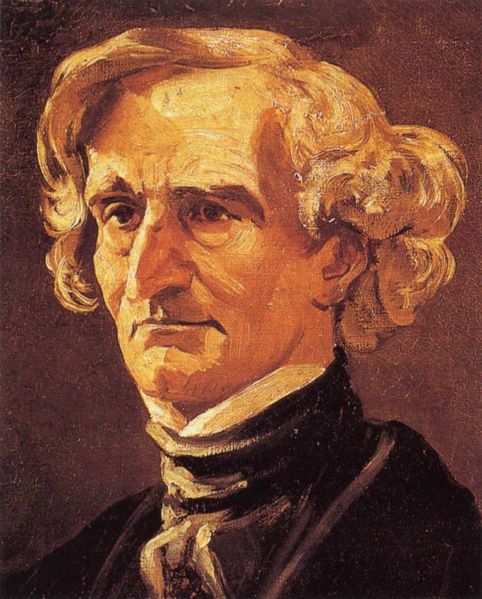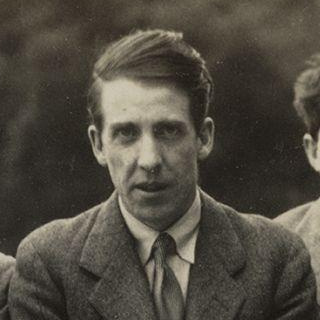Hector Berlioz: ‘I do not need any program--and never did need a program--to understand Berlioz’s Symphonie Fantastique, my pleasure in hearing it being purely musical and precisely of the same nature as my pleasure in hearing any one of Beethoven’s quartets.’Pleasures of Music
Bury The Program
By W.J. Turner
By vocation a poet, W.J. Turner (1889-1946) was professionally a music critic for the New Statesman and other periodicals. He gave permanent form to some of his ideas in his biographies of Mozart, Beethoven, Wagner and Berlioz, from the last of which the following is taken.
W.J. TurnerI ask any musician who reads these pages to consider the following facts. I would not venture to assert that my instinct for music was secondary to my instinct for words, yet what talent I have is entirely literary. But I do not need any program--and never did need a program--to understand Berlioz’s Symphonie Fantastique, my pleasure in hearing it being purely musical and precisely of the same nature as my pleasure in hearing any one of Beethoven’s quartets. Further, I find the greatest difficulty in even reading the “programs” or literary explanations of pieces of music, and am never helped or in any way enlightened as to the music by them. (1)
I carry this so far that I have never even read and rarely understood the texts of the majority of operas I have heard. For me music always speaks adequately without any words, and I judge it (rightly or wrongly) without reference to words. Even in the case of a modern opera like Wozzeck (2) I have never read Büchner’s play, and on the sole occasion on which I heard Wozzeck I did not understand one word in a hundred of the German text. But this did not prevent me from enjoying Berg’s music or from having very definite opinions about it. In short, I am of the opinion that the whole ancient controversy about program music was the result of a misconception and is a controversy about an illusion. The text of an opera, the words of a song, the program of a symphony or tone poem, or whatever name in the future may be given to any musical composition is of no importance or significance whatsoever. I know this will be going too far for the majority of musicians; nevertheless I am convinced that it is true, literally and strictly true.
Leonard Bernstein conducts the Orchestre National de France in Berlioz's Symphonie Fantastique, 1st movement: part 1: Largo (Rêveries), Paris, 1976In order, however, to make my meaning clearer, I will offer an analogy. If a painter like Cézanne were to make two pictures, two “still lifes,” one a picture of an apple and one a picture of a pear; and suppose in the catalogue by a mistake “The Pear” was numbered as “The Apple,” and vice versa. Now the fact that one picture had as its subject an apple and the other a pear would have no bearing on the pictorial or artistic merit of the paintings. In fact, when looking at them you wouldn’t bother about the subjects’ “apple” or “pear” at all. But if you looked at the catalogue and saw the apple picture labeled as “The Pear,” you would be worried at once. Why “The Pear”? you would ask. And unless you noticed that the pear picture was labeled “The Apple” and so surmised immediately that it was a simple mistake in cataloguing, you would be so fretted by this incongruity that you would no longer be able to look at the picture as a picture, a work of pictorial art, at all.
Leonard Bernstein conducts the Orchestre National de France in Berlioz's Symphonie Fantastique, 1st movement. part 2: Allegro agitato e appassionato assai (Passions); Paris, 1976Now this is what happens with program music and opera. Those whose innate sense of music is weak fasten on the label and cannot hear the music for seeing the label. Take the label off, bury it, and let them forget it utterly (if they can); and only then will they be able to listen to the music and hear what it is. But even then they may hear nothing at all, just as anyone whose pictorial sense is weak is incapable of seeing a picture but sees only a likeness to something. If the likeness to the label is for him invisible he declares it to be a bad picture, but he really doesn’t know what a picture is, good or bad. So those who say Berlioz’s music is not music are simply saying they can’t see its likeness to the label. To them I say, tear off the label, forget all about it, and listen again. If they have ears they will find it is music, pure music. Indeed, what else can it be, being merely a succession of sounds? The merit of this succession of sounds, its virtue, must be judged, can only be judged, by listening to it and ignoring all words, labels, descriptions, analyses, and explanations.
Now, I am perfectly aware that a deeper question is involved here, namely, the relation of the artist to his nominal subject. But people in general are not discussing this problem when they are discussing “program” music, abstract or representative art, or “pure” poetry; and I do not propose to discuss it either, for this is not the place for it. I will only say that in any case what is primarily important is the relationship between the artist and his subject. One can no more estimate the value of the subject in itself in a work of art than one can estimate the relative value of a sparrow or an eagle, a vegetable or a man, in the love of God. It is the love that gives value, and I do not propose, I repeat, to attempt to explain why God loves a sparrow or why Berlioz loves Harriet Smithson and composes a Symphonie fantastique rather than a string quartet. The value of the Symphonie fantastique--as of the C Sharp Minor Quartet (Beethoven’s Opus 131)--depends equally upon what Berlioz and Beethoven respectively give in their work. If Van Gogh chooses to paint a sunflower and Rembrandt an old woman, the virtue of their pictures depends entirely upon Van Gogh and on Rembrandt, and not upon the sunflower or the woman--which have both been the subjects of many lifeless and valueless but recognizable paintings. And if any humanist says there is more life in an old woman than in a sunflower, I reply, “How do you know?” It may be so, but to choose an old woman rather than a sunflower as a subject of a picture does not ensure a better picture.
Leonard Bernstein conducts the "Orchestre National de France" in Berlioz's Symphonie Fantastique, 2nd movement: Valse: Allegro non troppo (Un bal), Paris, 1976I therefore dismiss all this loose talk of “pure” music in the abstract as leading nowhere. We can only judge music as music, and its value is entirely independent of its program or label. If anyone says to me that Beethoven’s Pastoral Symphony is inferior to his Second Symphony because the former has a “program” and the latter has none. I simply do not understand him; his words seem to me to have no more meaning than if he were to say that the Sixth Symphony was inferior to the Second because six is an inferior number to two, or vice versa.
Berlioz: The Man And His Work (1934)
- One reason for this may be my literary sense, for all these texts and “programs” bore or irritate me by their (for me) unreadableness. [Turner’s note.]
- Wozzeck, an opera by Alban Berg. [Turner’s note.]
Founder/Publisher/Editor: David McGee
Contributing Editors: Billy Altman, Laura Fissinger, Christopher Hill, Derk Richardson
Logo Design: John Mendelsohn (www.johnmendelsohn.com)
Website Design: Kieran McGee (www.kieranmcgee.com)
Staff Photographers: Audrey Harrod (Louisville, KY; www.flickr.com/audreyharrod), Alicia Zappier (New York)
E-mail: thebluegrassspecial@gmail.com
Mailing Address: David McGee, 201 W. 85 St.—5B, New York, NY 10024




